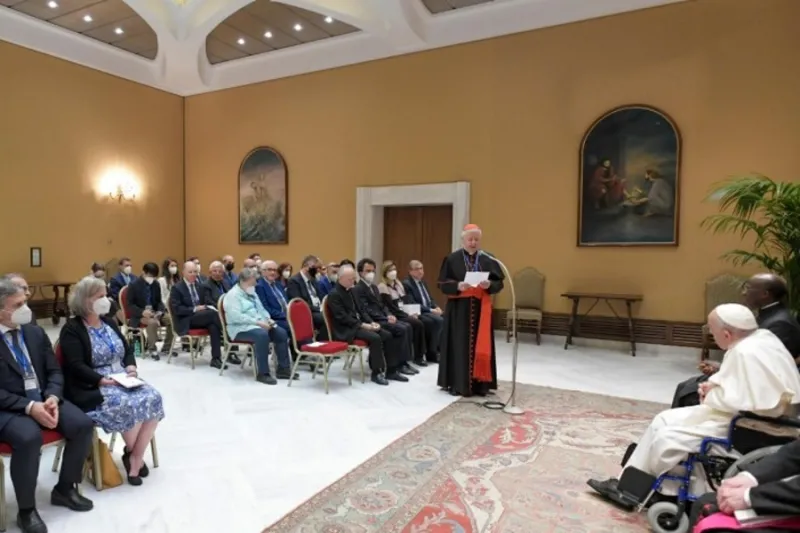
Rome Newsroom, Sep 13, 2022 / 09:00 am (CNA).
Pope Francis arrived in Kazakhstan Tuesday urging dialogue and peace in the face of Russia’s “senseless and tragic war” in Ukraine.
In a speech to Kazakh civil authorities and diplomats in the capital city of Nur-Sultan on Sept. 13, the pope said he wanted to “echo the plea of all those who cry out for peace.”
“I have come here as a pilgrim of peace, seeking dialogue and unity. Our world urgently needs peace: it needs to recover harmony,” Pope Francis said from the stage of the Qazaq Concert Hall.
“Kazakhstan represents a significant geopolitical crossroads, and so it has a fundamental role to play in lessening cases of conflict,” he said.
Russia’s war in Ukraine has loomed in the background of Pope Francis’ trip to the Central Asian country of Kazakhstan, a Muslim-majority country located between Russia and China. Kazakhstan and Russia share a 4,750-mile border, and the former Soviet country has historically been regarded as Moscow’s greatest ally after Belarus.
Since Russia’s invasion of Ukraine, Kazakh President Kassym-Jomart Tokayev has tried to balance the country’s relationship with Moscow with openness to the West.
Pope Francis met with Tokayev at the Presidential Palace in Nur-Sultan before addressing the country’s politicians and diplomats.
China’s President Xi Jinping is also expected to meet the Kazakh president on Sept. 14 on the Chinese leader’s way to a meeting with Vladimir Putin in Central Asia later this week.
“Those who hold greater power in the world have greater responsibility with regard to others, especially those countries most prone to unrest and conflict,” Pope Francis said in his first public speech of the three-day visit to the Kazakh capital.
“Now is the time to stop intensifying rivalries and reinforcing opposing blocs. We need leaders who, on the international level, can enable peoples to grow in mutual understanding and dialogue … For this to happen, what is needed is understanding, patience, and dialogue with all. I repeat: with all,” he said.
During the pope’s Sept. 13–15 trip to Kazakhstan, he will participate in the Seventh Congress of Leaders of World and Traditional Religions, an interreligious summit held every three years. The pope said in his speech that “religious freedom represents the best channel for civil coexistence.”
Pope Francis is the second pope to visit Kazakhstan. He recalled St. John Paul II’s visit to the Central Asian country in the wake of the terrorist attack on Sept. 11, 2001, noting that the Polish pope called Kazakhstan a “land of martyrs and of believers, land of deportees and of heroes, land of intellectuals and artists.”
“How can we fail to recall in particular the prison camps and the mass deportations that witnessed, in the cities and in the boundless steppes of these regions, the oppression of so many peoples?” Pope Francis said.
“In this land, traversed from ancient times by great displacements of peoples, may the memory of the sufferings and trials you endured be an indispensable part of your journey towards the future, inspiring you to give absolute priority to human dignity, the dignity of every man and woman, and of every ethnic, social, and religious group,” he said.
If you value the news and views Catholic World Report provides, please consider donating to support our efforts. Your contribution will help us continue to make CWR available to all readers worldwide for free, without a subscription. Thank you for your generosity!
Click here for more information on donating to CWR. Click here to sign up for our newsletter.






His Holiness Pope Francis is an ambassador of the Good News of peace, solidarity, mercy, and compassion. May the Holy Father be blessed with good health.